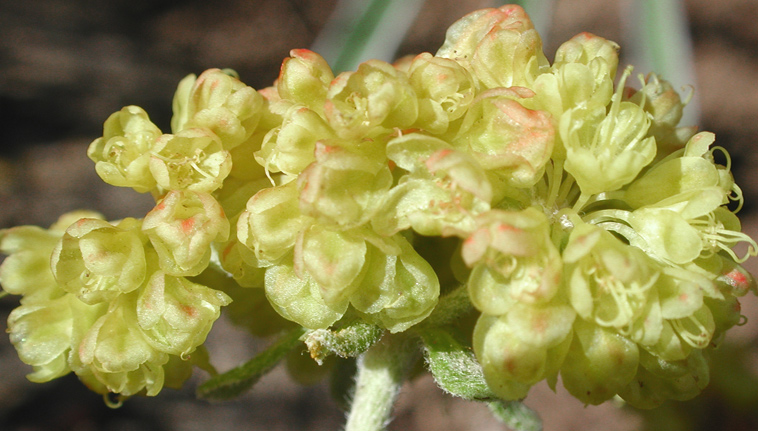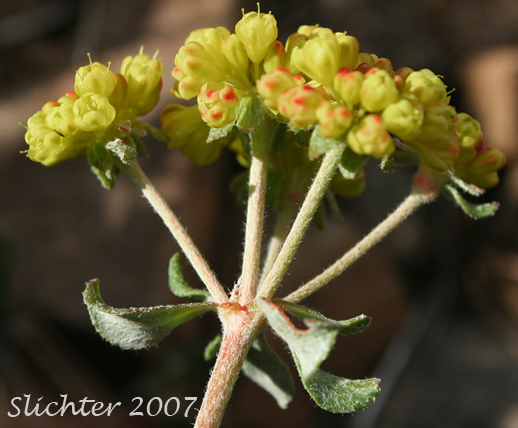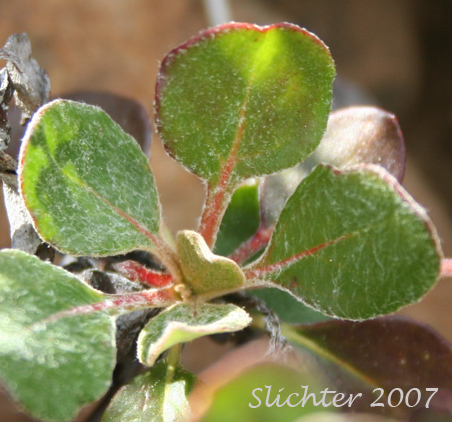 The
photo at right shows the greener and less tomentose upper and whitish, tomentose
lower leaf surfaces of Eriogonum umbellatum var. umbellatum from the Umatilla NF in the Blue Mts of Oregon..........June 17, 2001.
The
photo at right shows the greener and less tomentose upper and whitish, tomentose
lower leaf surfaces of Eriogonum umbellatum var. umbellatum from the Umatilla NF in the Blue Mts of Oregon..........June 17, 2001.
Sulfur buckwheat is an attractive, but variable, perennial species. The plants when prostrate, may be as much as 60 cm wide. The stems lack leaves, but a whorl of leafy bracts may be found directly below the inflorescence. The leaves are mostly basal, with the blades oval or elliptical in shape with long, thin petioles, and fairly tomentose especially on the lower surfaces. The upper leaf surfaces are often greener. The leaves are generally more or less elliptic in shape and range from 1-4 cm long and about 5-20 mm wide. The flower stems range from 10-200 cm high.
The inflorescence is typically an open umbel or occasionally head-like at the ends of erect stems. Several leaf-like bracts subtend the inflorescence. The umbels are usually 2-10 rayed with individual rays from very short to 12 cm long. One involucre is usually found per ray. The pubescent to lanate involucres are conical to narrowly bell-shaped with linear-lanceolate to oblong lobes from 2-3 mm long. The 6-12 involucral lobes are commonly reflexed or spreading and nearly equal in length to the tube. Individual involucres are 20-40 flowered. The perianth is glabrous with lobes from 2.5-5 mm long that are typically creamy, or frequently a light to bright yellow as in the variety shown above. The yellow flowers may also be tinged with red. The fruits are glabrous and range from 2-5 mm long.
Sulfur buckwheat is a varied species, found with sagebrush in the lowlands, to exposed alpine ridges, on both rocky and sandy substrates.
A widespread species, sulfurflower is found from southern British Columbia, south along the eastern edge of the Cascades and Sierra Nevada Mts. to southern California, and eastward to the east side of the Rocky Mts.
This is a pretty wildflower of long bloom period, with interesting foliage which could be used successfully in rockeries or dry, natural garden, especially in the intermountain region. It will survive west of the Cascades, but needs good drainage and perhaps some protection from winter rains.

This list is incomplete. It is based off of current taxonomy as per the USDA flora site, but I lack differentiation as to the characteristics and ranges of some of the varieties of sulfur buckwheat, and because of name changes, several varieties may be listed twice.
variety argus: Leaf blade margins often finely wavy. Inflorescence compound, often with alternate to whorled bracts near the middle. Individual rays are often branched again. The inflorescence is thinly tomentose. Perianth 3-8 mm, bright yellow. Often found on serpentine. Found from southwest Oregon to the Klamath Region and high North Coast Range of northwestern California.
variety aureum (formerly var. intectum): Primary rays of umbel simple, not branched or bracteate in the middle. Plants over 10 cm tall and the umbels open. Perianth yellow. Leaves glabrous on both surfaces with elliptic leaves. Found from southern Oregon and Idaho south to Nevada and Utah and east to Wyoming.:
variety chrysanthum: Primary rays of umbel compoundly branched. Leaves glabrous on both surfaces. Found from southern Washington to south-central Oregon.
variety dichrocephalum (formerly var. aridum): The leaf blades are more or less elliptic and generally subglabrous below. The infloresecnce is simple and subglabrous. The perianth is 4-8 mm long and whitish to pale yellow in color, often conspciuously striped. Found on sand,,, gravel or rock in California in the Warner Mts and in the White and Inyo Mts. It is found north in the Great Basin to southeastern Oregon and east to Montana and Wyoming.
variety ellipticum (formerly var. croceum or stellatum): Primary rays of umbel compoundly branched up to 2-3 times. The umbellets are each usually subtended by a whorl of bracts. Underside of leaves tomentose. Found from southeastern Washington and northeastern Oregon south to California and east to central and southwestern Idaho.
variety glaberrimum: Green Buckwheat- Inflorescence compound with primary rays of umbel with bracts but not compoundly branched. Leaves glabrous on both surfaces and with blades more or less oblanceolate in shape. The perianth is 4-7 mm long and whitish to cream in color. Found on sand or gravel in south-central Oregon and in the Warner Mts of northeastern California.
variety goodmanii:
variety hausknechtii: Primary rays of umbel simple, not branched or bracteate in the middle. Plants alpine or subalpine, prostrate and dwarf-like. The flower stems rarely to 10 cm high. Found in the Cascade Mts. from southern Washington to central Oregon.
variety hypoleium: Primary rays of umbel simple, not branched or bracteate in the middle. Plants over 10 cm tall and the umbels open. Perianth yellow. Leaves glabrous on both surfaces with slightly tomentose margins and midrib. Leaves obovate in outline. Found in the Wenatchee Mts. of Washington.
variety majus (formerly var. subalpinum): Primary rays of umbel simple, not branched or bracteate in the middle. Plants over 10 cm tall and the umbels open. Leaves less densely tomentose. Perianth white, cream, or pale yellow. Plants of the foothills up to 9000' in the mountains. Found from southern British Columbia east to the Rocky Mts. of Montana and Colorado and south to the Blue Mts of Oregon.
Modoc Sulphur Flower: Eriogonum umbellatum var. modocense (Synonym: Eriogonum umbellatum var. polyanthum)
variety nevadense: A subshrub with the leaf blades moreor less thinly tomentose below. The inflorescence is simple and thingly tomentose. The perianth is 4-7 mm long and yellow. Found in California on the east slope of the Sierra Nevada, in the northwestern Mohave Desert and in the Great Basin of southern Oregon and central Nevada.
variety umbellatum: Primary rays of umbel simple, not branched or bracteate in the middle. Plants over 10 cm tall and the umbels open. Perianth yellow. Leaves tomentose below and sparsely tomentose to glabrous above. Found east of the Cascade Mts. from Washington south to California and east to the Rocky Mts from Wyoming south to Arizona.



